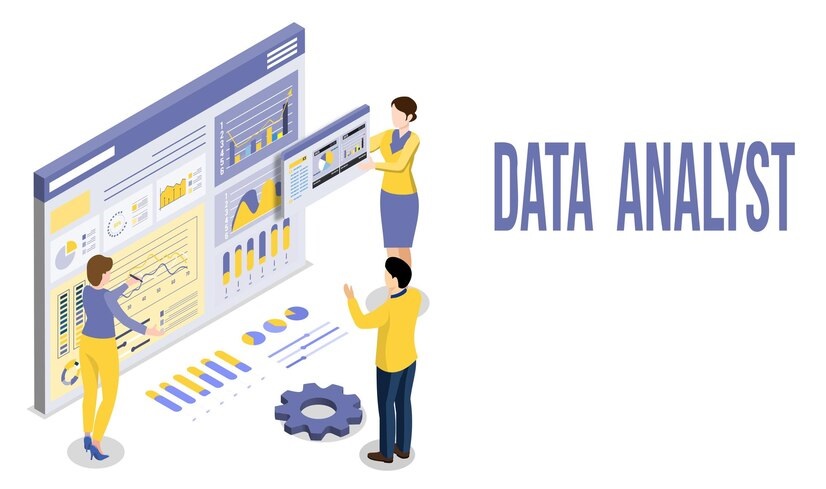1. Introduction to Remote Data Analyst Jobs: (Data Analysis)
Remote work is on the rise, and the field of data analysis is no exception. Companies worldwide are embracing the flexibility of remote positions, opening up a world of opportunities for data analysts. In this guide, we’ll explore the benefits, key skills, job search strategies, and tools necessary for success in the realm of remote data analysis.

Table of Contents
2. Benefits of Working as a Remote Data Analyst: (Data Analysis)
Working remotely as a data analyst comes with numerous advantages. Enjoy the freedom to set your schedule, increased productivity in a personalized environment, and access to a global job market without geographical constraints.
Follow these steps to implement:
1 – Set Up a Dedicated Workspace:
Create a quiet, organized space conducive to focused work.
2 – Time Management:
Establish a routine to optimize your productivity.
3 – Global Networking:
Leverage online platforms to connect with professionals worldwide.
3. Key Skills for Remote Data Analysts: (Data Analysis)
Success in remote data analysis requires a specific skill set. Develop and showcase skills like strong communication, self-discipline, and proficiency in relevant tools and technologies.
Follow these steps to implement:
1 – Online Learning Platforms:
Upskill in data analysis tools through courses.
2 – Effective Communication:
Hone written and verbal communication skills.
3 – Self-Discipline Techniques:
Develop routines and strategies to stay focused.
4. Finding Remote Data Analyst Opportunities: (Data Analysis)
Discovering remote data analyst opportunities requires a strategic approach. Explore specialized job boards, network with professionals in the field, and leverage online platforms catering specifically to remote positions.
Follow these steps to implement:
1 – Remote Job Platforms:
Explore websites like Remote OK, We Work Remotely, and LinkedIn for tailored job listings.
2 – Networking:
Join online communities, attend virtual events, and connect with professionals in the remote data analysis space.
3 – Company Websites:
Visit the careers section of companies known for embracing remote work.
5. Crafting an Outstanding Remote Data Analyst Resume:
Tailoring your resume for remote data analyst positions is crucial. Highlight relevant skills, emphasize remote work experience, and showcase your ability to thrive in a virtual environment.
Follow these steps to implement:
1 – Keyword Optimization:
Include remote work-related keywords in your resume.
2 – Highlight Remote Experience:
Showcase successful remote projects and achievements.
3 – Quantify Achievements:
Use metrics to quantify the impact of your data analysis projects.
6. Preparing for Remote Data Analyst Interviews:
Follow these steps to implement:
1 – Technical Demonstration:
Be ready to showcase your data analysis skills through practical exercises.
2 – Adaptability:
Highlight experiences of successfully adapting to remote work challenges.
3 – Effective Communication:
Practice clear and concise communication for virtual interviews.
7. Tools and Technologies for Remote Data Analysts:
Equipping yourself with the right tools and technologies is essential for remote data analysts. Familiarize yourself with collaborative platforms, communication tools, and data analysis software.
Follow these steps to implement:
1 – Collaboration Platforms:
Explore tools like Slack, Microsoft Teams, or Zoom for effective communication.
2 – Data Analysis Software:
Stay updated on the latest versions of tools like Python, R, or SQL.
3 – Project Management Tools:
Utilize tools such as Trello or Jira for organized project management.
More about – Data analysis
Our Recent Post – The best way to get started with Python data structures

Conclusion: (Data Analysis)
Embrace the remote work revolution in the field of data analysis. Equip yourself with the right skills, navigate job opportunities strategically, and excel in virtual interviews. By implementing these steps, you’ll position yourself for success in the dynamic and ever-growing world of remote data analyst positions.
FAQs
Q: What are the key skills that remote data analysts should possess?
A: Remote data analysts should have strong communication skills, self-discipline, proficiency in data analysis tools, and the ability to work independently. Effective time management and adaptability to virtual collaboration are also crucial for success in remote roles.
Q: How can I find remote data analyst opportunities?
A: Explore specialized job boards like Remote OK and We Work Remotely, connect with professionals in online communities, and check the careers sections of companies known for embracing remote work. Networking and leveraging platforms like LinkedIn are also effective ways to discover remote data analyst positions.
Q: What should be highlighted in a resume for a remote data analyst position?
A: In a resume for a remote data analyst role, emphasize relevant skills, highlight successful remote work experience, and quantify achievements using metrics. Optimize your resume with keywords related to remote work and showcase your ability to thrive in a virtual environment.
Q: How can one prepare for virtual interviews for remote data analyst jobs?
A: Prepare for virtual interviews by showcasing technical skills through practical exercises, demonstrating adaptability to remote work challenges, and practicing clear and concise communication. Be ready to discuss experiences that highlight your ability to succeed in a virtual work environment.
Q: What are the essential tools and technologies for remote data analysts?
A: Remote data analysts should be familiar with collaboration platforms like Slack and Zoom for effective communication. Stay updated on the latest versions of data analysis tools such as Python, R, or SQL, and utilize project management tools like Trello or Jira for organized work.
Q: What are the potential challenges of remote work for data analysts?
A: Challenges of remote work for data analysts may include the need for strong self-discipline, potential feelings of isolation, and effective communication in a virtual setting. Overcoming these challenges requires adopting strategies like creating a dedicated workspace, actively participating in online communities, and utilizing collaborative tools for effective communication.
